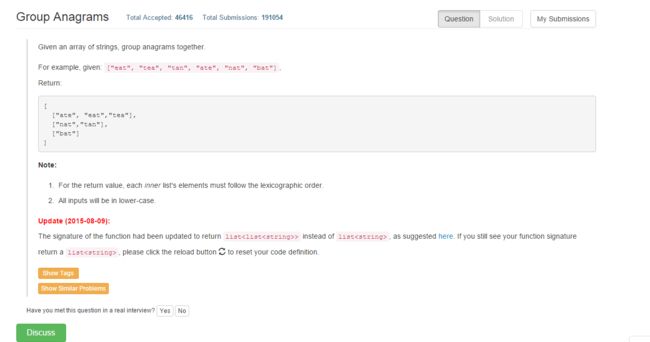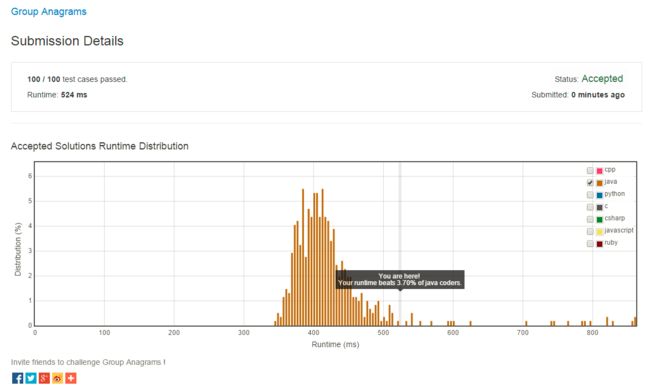My code:
import java.util.ArrayList;
import java.util.Arrays;
import java.util.HashMap;
import java.util.List;
public class Solution {
public List> groupAnagrams(String[] strs) {
if (strs == null)
return null;
ArrayList> result = new ArrayList>();
ArrayList group = new ArrayList();
if (strs.length == 0) {
return result;
}
Arrays.sort(strs);
HashMap> hm = new HashMap>();
for (int i = 0; i < strs.length; i++) {
char[] tempCharArray = strs[i].toCharArray();
Arrays.sort(tempCharArray);
String tempStr = String.valueOf(tempCharArray);
if (!hm.containsKey(tempStr)) {
ArrayList tempArrayList = new ArrayList();
tempArrayList.add(i);
hm.put(tempStr, tempArrayList);
}
else {
ArrayList tempArrayList = hm.get(tempStr);
tempArrayList.add(i);
hm.put(tempStr, tempArrayList);
}
}
for (ArrayList temp : hm.values()) {
for (Integer index : temp)
group.add(strs[index]);
result.add(new ArrayList(group));
group = new ArrayList();
}
return result;
}
public static void main(String[] args) {
Solution test = new Solution();
String[] a = {"a"};
System.out.println(test.groupAnagrams(a));
}
}
My test result:
首先说下测试结果为什么这么慢。我的理解是,这道题目是8.9才改题的,之前的用户数据可能还保存着,导致我的排名很低。但其实,题目改了之后,复杂度就变了。
这道题目感觉学到了很多。
- 如何对 string 排序, 利用java API
char[] arr = str.toCharArray();
Arrays.sort(arr);
String s = String.valueOf(arr);
- 用什么去接收Collections 类。 如何获得 HashMap values 的迭代器,使用 .values() 方法
如果value是 T 类型。那么,
for (T temp : hashmap.values())
......
- new ArrayList
(5); 并不能生成一个 含有 5 的链表。必须要先new一个新的arraylist,然后再插入5进去。
**
总结: String, HashMap, Collections, string sort
**
Anyway, Good luck, Richardo!
My code:
public class Solution {
public List> groupAnagrams(String[] strs) {
ArrayList> ret = new ArrayList>();
if (strs == null || strs.length == 0)
return ret;
/** key: sorted string value: list for string, convenient for sorting later */
HashMap> tracker = new HashMap>();
for (int i = 0; i < strs.length; i++) {
String curr = strs[i];
char[] currChar = curr.toCharArray();
Arrays.sort(currChar);
curr = new String(currChar);
if (tracker.containsKey(curr)) {
List list = tracker.get(curr);
list.add(strs[i]);
}
else {
ArrayList list = new ArrayList();
list.add(strs[i]);
tracker.put(curr, list);
}
}
/** traverse the key set of hashmap, sort sub list and add into ret */
for (String key : tracker.keySet()) {
ArrayList list = tracker.get(key);
Collections.sort(list);
ret.add(list);
}
return ret;
}
}
这道题木卡了一会儿。问题出在哪里?
char[] tmp = ...
tmp.toString() 返回的是该数组的内存地址,而不是转换而来的 String!!
一定要当心。
其他没什么问题了。
对数组排序,
Arrays.sort();
对链表排序,
Collections.sort();
Anyway, Good luck, Richardo!
My code:
public class Solution {
public List> groupAnagrams(String[] strs) {
List> ret = new ArrayList>();
HashMap> map = new HashMap>();
for (int i = 0; i < strs.length; i++) {
char[] arr = strs[i].toCharArray();
Arrays.sort(arr);
String s = String.valueOf(arr);
if (map.containsKey(s)) {
map.get(s).add(strs[i]);
}
else {
map.put(s, new ArrayList());
map.get(s).add(strs[i]);
}
}
for (String ss : map.keySet()) {
Collections.sort(map.get(ss));
}
for (String ss : map.keySet()) {
ret.add(map.get(ss));
}
return ret;
}
}
并不难,但复杂度不小,因为每个string都需要sort
后来看到了一个新的方法,更高效,利用hashcode 的思想。
统计每个字母的个数与 int[26] nums
然后Arrays.hashCode(nums) 拿到哈希值作为hashtable的key
My code:
public class Solution {
public List> groupAnagrams(String[] strs) {
List> ret = new ArrayList>();
if (strs == null || strs.length == 0) {
return ret;
}
HashMap> map = new HashMap>();
for (int i = 0; i < strs.length; i++) {
int id = getID(strs[i]);
if (!map.containsKey(id)) {
map.put(id, new ArrayList());
}
map.get(id).add(strs[i]);
}
for (Integer i : map.keySet()) {
ret.add(map.get(i));
}
return ret;
}
private int getID(String s) {
int[] nums = new int[26];
for (int i = 0; i < s.length(); i++) {
nums[s.charAt(i) - 'a']++;
}
return Arrays.hashCode(nums);
}
}
reference:
https://discuss.leetcode.com/topic/56803/beat-90-2-18ms-o-n-non-sort-solutions-with-hashmap
Anyway, Good luck, Richardo! -- 09/20/2016

